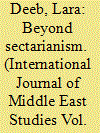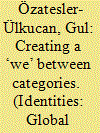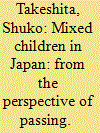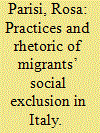| Srl | Item |
| 1 |
ID:
172449


|
|
|
|
|
| Summary/Abstract |
Based on interviews with Lebanese in over 150 mixed-religion marriages and their extended family members, I argue that sect may conceal or stand in for other forms of difference, including ideas about status and hierarchy related to class and regional origin in Lebanon. Because it is the most readily available discourse for understanding social difference, parents often use sectarian rhetoric to describe their concerns about a variety of problems they see in their children's chosen partners. By listening between the lines of parental objections, I suggest that expressions of bias against people of other sects may mask concerns with other forms of social difference, in effect reducing a complex and shifting social field of multiple axes of difference into sect. Rather than assume sectarianism's a priori importance, this approach allows me to bring other discourses of difference and analytic lenses to the foreground.
|
|
|
|
|
|
|
|
|
|
|
|
|
|
|
|
| 2 |
ID:
176989


|
|
|
|
|
| Summary/Abstract |
Through the findings of research on Alevi and Sunni intermarriages in Izmir, Turkey, this article shows how partners in such marriages recognize differences between Sunniness and Aleviness, how they identify themselves in relation to these categories and define them, and how their marriage influences their identifications. The article presents how the intermarried spouses’ own definitions of their background categories reveal the influences of the historical construction of these categories in relation to each another, political stances and current negotiations. Self-identifications and perceptions of differences are handled within these influences while unifying criteria transcending the boundaries of these categories enable them to build on a sense of ‘we’. The findings show the spouses’ ambiguous, fluid, relational and contextual definitions and identifications within their understandings of one another as parts of a ‘we’, their ways of living together despite categorical and group differentiations, and negotiations within local and global discourses.
|
|
|
|
|
|
|
|
|
|
|
|
|
|
|
|
| 3 |
ID:
174810


|
|
|
|
|
| Summary/Abstract |
This study adopts Goffman’s concept of ‘passing’ to discuss the experiences of mixed children in Japan. Passing is ‘the management of undisclosed discrediting information about self’ and is a concept that has been evolved in the context of stigma. Since 1999, The author has conducted interviews with 139 mixed families of diverse nationalities and religions residing in Japanese urban areas. The aim of this research is to unravel two issues: First, do mixed children perceive their mixed background as a stigma? And second, do passing mixed children feel insecure or guilty about the fact that they are passing? This article concludes that whether or not the child is ‘visibly’ different from other children in Japanese society, and how their parents and teachers perceive their situations are major factors shaping the children’s experiences.
|
|
|
|
|
|
|
|
|
|
|
|
|
|
|
|
| 4 |
ID:
141470


|
|
|
|
|
| Summary/Abstract |
The article aims to investigate the intersection of legislative dimensions, economic conditions and intimate life contributing to racialising and marginalising the poorest non-European migrants. First, this article focuses on the central role played by the private life in claiming citizenship rights and in building a sense of belonging within migratory contexts. As a result, mixed couples become a border zone through which the state disciplines immigrants according to their class, nationality and gender. On the other side, mixed couples and their intimate lives define resistance against the state’s biopolitical power to control people and become the space of intimate citizenship. Second, the article analyses the matrix for immigrants’ exclusion and differentiation embodied within the institutional and legislative system through immigration and citizenship laws. Therefore, the ‘coloniality power matrix’ becomes an active component of the naturalisation system of social differences at an institutional level.
|
|
|
|
|
|
|
|
|
|
|
|
|
|
|
|